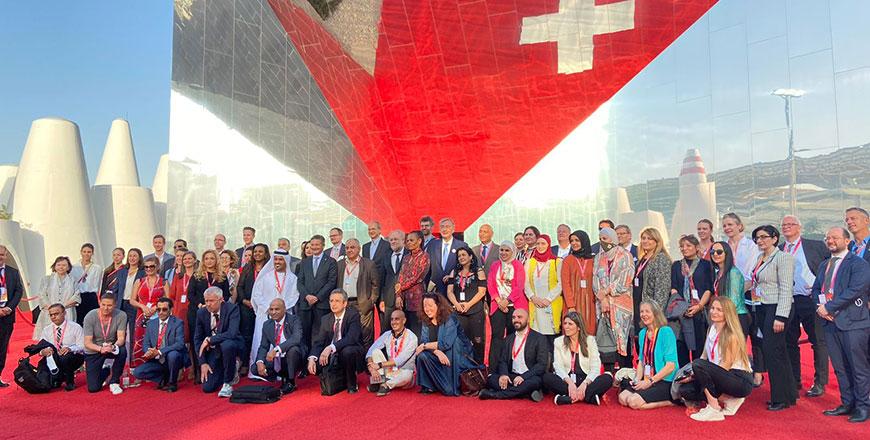You are here
Blue Peace launches new phase committed to WEFE nexus
By Hana Namrouqa - Mar 14,2023 - Last updated at Mar 14,2023

Maysoon Al Zou’bi, chair of the Blue Peace Middle East Managing Committee, speaks during the launch of the initiative’s second phase in Amman on Tuesday (Photo courtesy of Blue Peace Middle East)
AMMAN — What started as an abstract concept for turning water from a potential cause of war to a driver of peace over a decade ago grew into a regional mechanism that now explores the synergies between water, energy, food and ecosystems in the Middle East.
The Blue Peace, a regional initiative dedicated to promoting water cooperation and peace in the Middle East, on Tuesday launched its second phase, which will accommodate all its activities under the umbrella of its Water-Energy-Food-Ecosystems (WEFE) Nexus Programme.
As part of the programme, the Blue Peace Middle East is carrying out an assessment of WEFE Nexus capacities and opportunities in the region with the aim of developing and implementing a number of targeted transboundary WEFE pilot projects.
A regionally owned dialogue platform, with members from Iraq, Jordan, Lebanon, Syria and Turkey, the Blue Peace Middle East was established in 2010. It uses dialogue, capacity building and action to realise its vision of using the power of water to build a peaceful future for the region. The initiative receives support from the Swiss Agency for Development and Cooperation (SDC).
At the launch of the new phase, experts indicated that there is regional agreement regarding the potential of the WEFE nexus to increase water cooperation between the countries of the region, presenting many promising opportunities for building trust in the region.
Ambassador of Switzerland to Jordan Emilija Georgieva said that access to water is a human right and is one of the UN Sustainable Development Goals, highlighting that her country is committed to achieving the SDGs and to fighting against climate change.
“We also see that climate change can aggravate water scarcity, and we believe that this can lead to migration and conflict. Water is thus directly linked to peace and security,” Georgieva said.
With the majority of water resources in the Middle East being of a trans-boundary nature, including aquifers and surface water, water experts highlighted the need for a regional agreement that governs the quality and quantity of shared water.
The Blue Peace Initiative maintains that any two countries engaged in active water cooperation do not go to war, highlighting the strong correlation between the degree of cooperation over water and the general atmosphere of peace and friendship between any two or more countries. However, out of the 148 countries that share water resources, 37 nations do not engage in cooperation over the management of water resources.
Maysoon Al Zou’bi, an expert on water and water diplomacy and chair of the Blue Peace ME Managing Committee, said that over the past 12 years, the initiative has established a close-knit community of experts from different backgrounds with solid scientific, practical and political experience working together to advance cooperation, dialogue and peace in the region.
“We knew from the beginning that it would be challenging and that it would take time to build trust between us. However, we also all recognise the importance of cooperation for the future of our region, not just over water, but also energy, food and ecosystems.”
Since January 2019, the initiative has been led by the Blue Peace Middle East Regional Mechanism, which facilitates political and technical dialogue about water and supports the implementation of regional projects in member countries.
Under the new phase, the initiative is working on the development of a Blue Peace Middle East Youth Fellowship Programme, under which recent graduates from the region will be introduced to Blue Peace ME and will jointly contribute to the development of its WEFE Nexus activities.
The initiative’s various activities have included a regional project on water use efficiency in agriculture led by the Turkish Water Institute, research, data collection and capacity-building projects in the transboundary Yarmouk and Tigris basins, the establishment of the Water Diplomacy Centre at the Jordan University of Science and Technology, the establishment of the Blue Peace Media Community, a water journalism platform that supports the development of a new narrative around water and resource management in the region and projects to support entrepreneurship and innovation in the water and sanitation sector in Iraq, Jordan and Lebanon.
Related Articles
DUBAI — Although the Middle East is one of the world’s most water-strained areas, where fresh water dropped by two-thirds over the past four
ENTEBBE, Uganda — A common vision and a joint secretariat can pave the way to cooperation on river basins and water resources in the Middle













